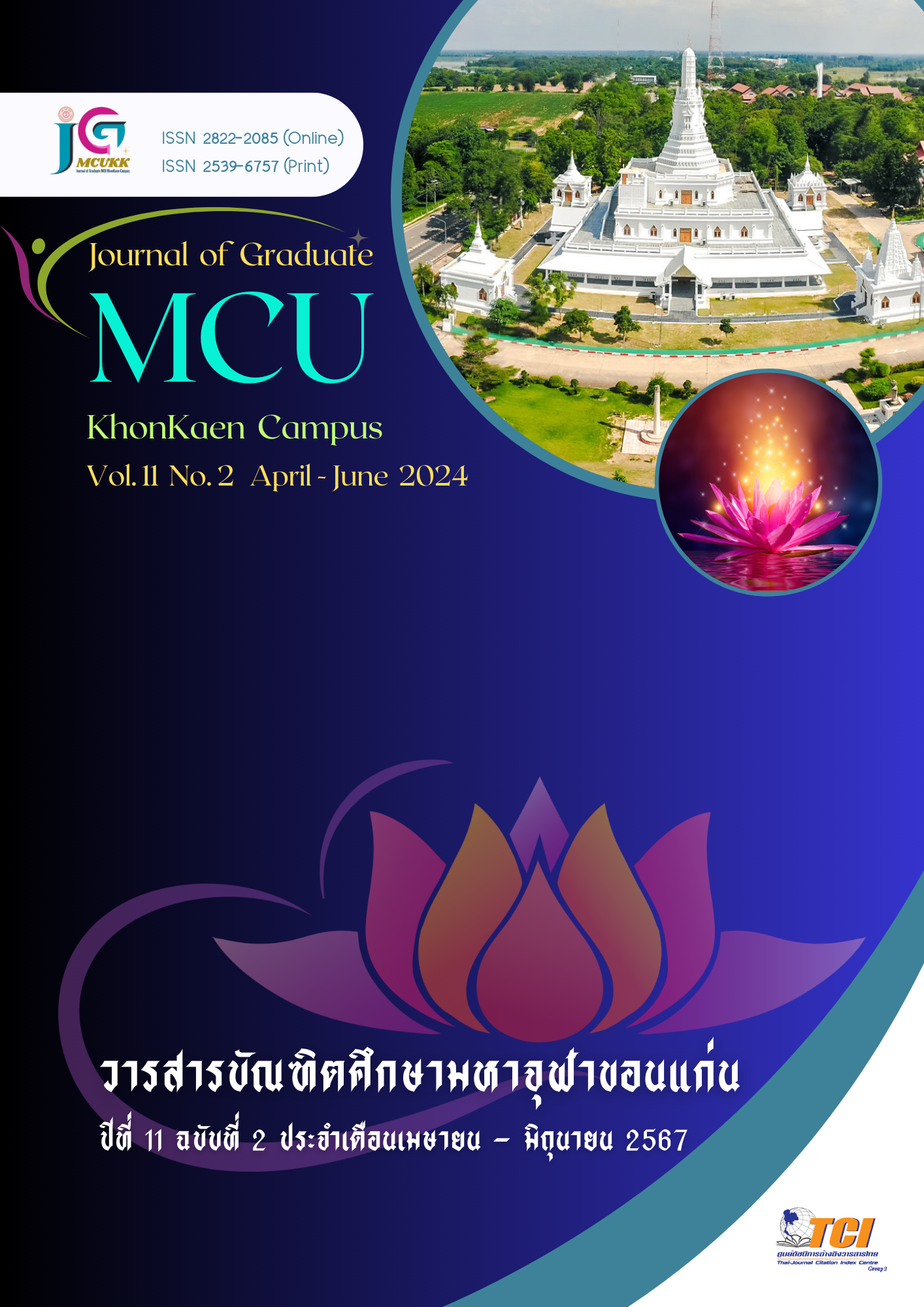Buddhist Approach to Manage Conflicts in the Use of Community Forest Resources at Ban Na Wai, Na Muen District, Nan Province
Main Article Content
Abstract
From the study, the following results are found:
1) From analyzing the level of conflict management in the use of community forest resources at Ban Na Wai in all 5 aspects, it is found that the mean of relationship, values and structure are at a very satisfied level, news and information and benefits are at a moderate level.
2) From comparing conflicts in the use of community forest resources, it is discovered that people of different genders, ages, educational levels, incomes, and occupations have no difference in the level of conflict management in the use of
community forest resources at Ban Na Wai; therefore, the null hypothesis is rejected.
3) Conflict management in the use of community forest resources based on Saraniyadhamma (states of conciliation) reveals as follows: Sadharanabhogita refers to sharing within the community to help reducing and solving conflicts; Mettamanokamma refers to adhering to the Dhamma for solving conflicts; Mettakayakamma refers to
structure for working systematically; Mettavacikamma refers to the use of words to create peace in the community; Silasamaññata refers to honest conduct; and Ditthisamaññata refers to equality in thoughts and accepting others' viewpoints.
Article Details

This work is licensed under a Creative Commons Attribution-NonCommercial-NoDerivatives 4.0 International License.
References
กาญจนา คุ้มทรัพย์. (2558). การจัดการป่าชุมชนอย่างยั่งยืน กรณีศึกษาป่าชุมชนบ้านดอนหมู จังหวัดอุบลราชธานี. วารสารการเกษตรราชภัฏ, 14(1), 31-36.
ชาย โพธิสิตา. (2561). ศาสตร์และศิลป์แห่งการวิจัยเชิงคุณภาพ. กรุงเทพฯ: อัมรินทร์พริ้นติ้ง แอน พลับบิชชิ่ง.
ณรงค์ เพชรประเสริฐ. (2553). สวัสดิการสังคมในมิติกินดี อยู่ดี มีสุข มีสิทธิ. (พิมพ์ครั้งที่ 3). กรุงเทพฯ: เอดิสันเพรส โปรดักส์.
บัวพันธ์ พรหมพักพิง. (2560). แนวคิดและทฤษฎีการพัฒนาจากความมั่งคั่งทางวัตถุสู่ความอยู่ดีมีสุขประชาชาติ. (พิมพ์ครั้งที่ 2). ขอนแก่น: มหาวิทยาลัยขอนแก่น.
บุญใจ ศรีสถิตนรากูร. (2555). การพัฒนาและตรวจสอบคุณภาพเครื่องมือวิจัย : คุณสมบัติการวัดเชิงจิตวิทยา. กรุงเทพฯ: จุฬาลงกรณ์มหาวิทยาลัย.
พระมหาดวงเด่น ฐิตญาโณ และคณะ. (2561). ปรัชญาความขัดแย้ง. วารสารสันติศึกษาปริทรรศน์ มจร., 6(1), 284-292.
พระมหาสุริยะ มทฺทโว, ธัชชนันท์ อิศรเดช และ เกียรติศักดิ์ สุขเหลือง. (2564). การประยุกต์หลักสาราณียธรรมเพื่อส่งเสริมความผูกพันต่อองค์กรของบุคลากรเทศบาลในจังหวัดนครราชสีมา. วารสาร มจร สังคมศาสตร์ปริทรรศน์, 10(2), 263-276.
พระมหาเอกมร ฐิตปญฺโญ (คงตางาม). (2553). ความคิดเห็นของประชาชนที่มีต่อการบริหารงานตามหลักสาราณียธรรม ขององค์การบริหารส่วนตำบล ในอำเภอดอนมดแดง จังหวัดอุบลราชธานี. (วิทยานิพนธ์พุทธศาสตรมหาบัณฑิต). พระนครศรีอยุธยา: มหาวิทยาลัยมหาจุฬาลงกรณราชวิทยาลัย.
เพ็ญแข แสงแก้ว. (2553). การวิจัยทางสังคมศาสตร์. (พิมพ์ครั้งที่ 3). กรุงเทพฯ: มหาวิทยาลัยธรรมศาสตร์.
สำนักบริหารการทะเบียน กรมการปกครอง กระทรวงมหาดไทย. (2563). สถิติประชากร. สืบค้นเมื่อ 14 กรกฎาคม 2566, จาก http://www.dopa.go.th/index_3.html
สำเริง จันทรสุวรรณ. (2550). สถิติเพื่อการวิจัยทางสังคมศาสตร์. (พิมพ์ครั้งที่ 2). ขอนแก่น: มหาวิทยาลัยขอนแก่น.

